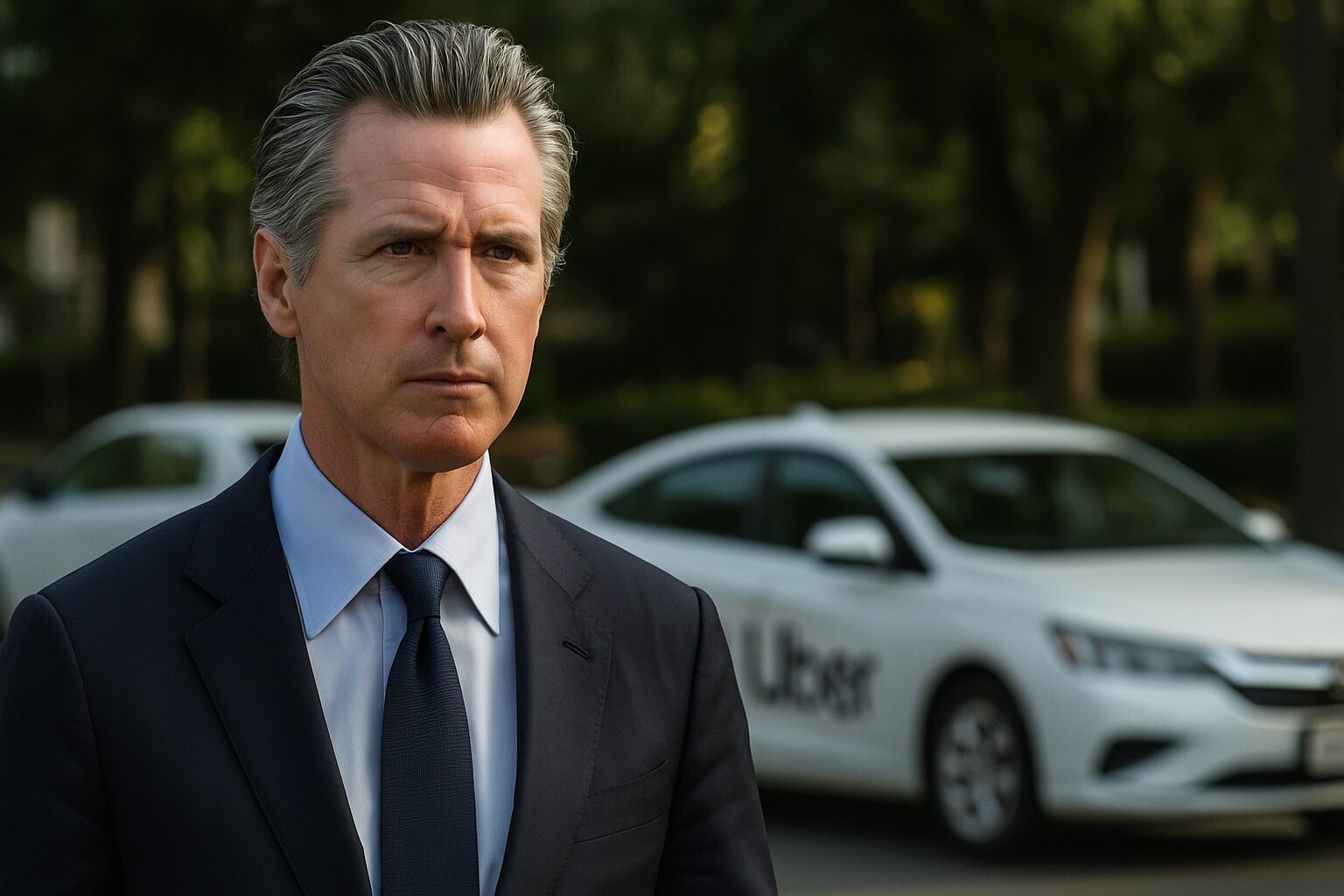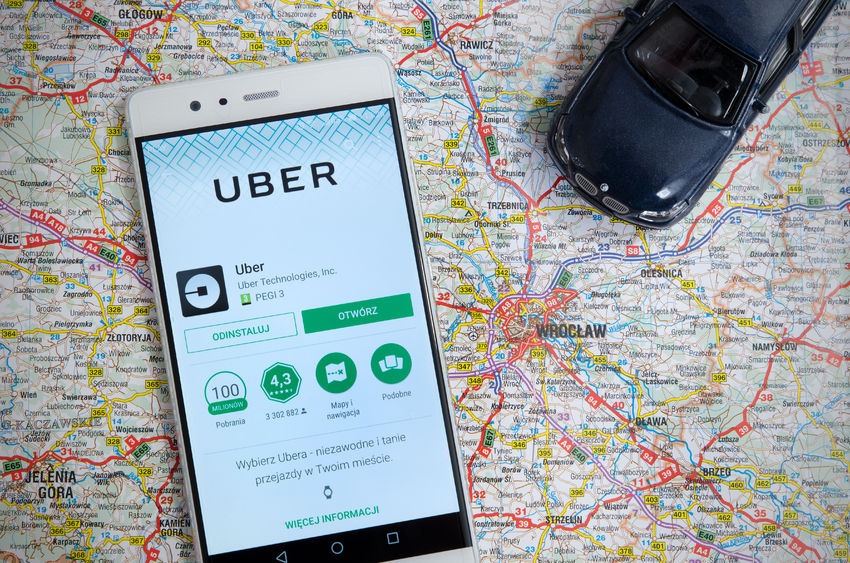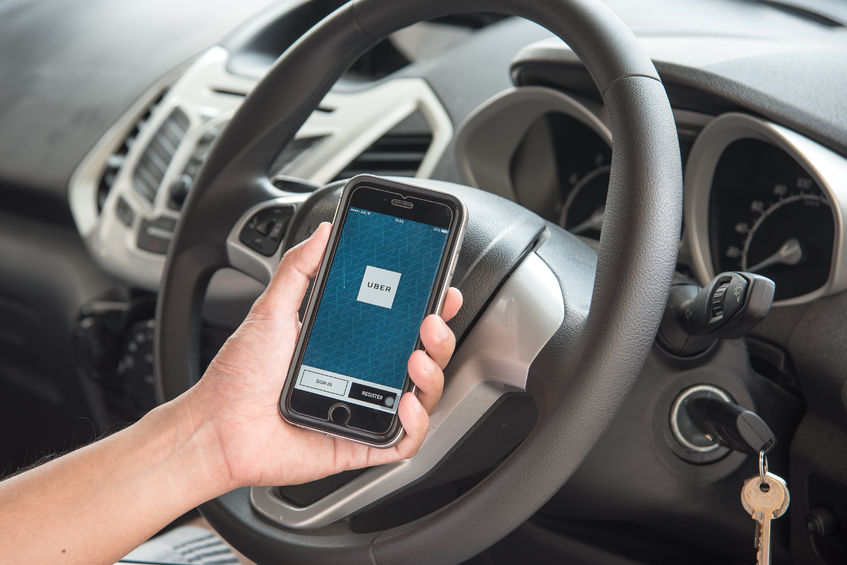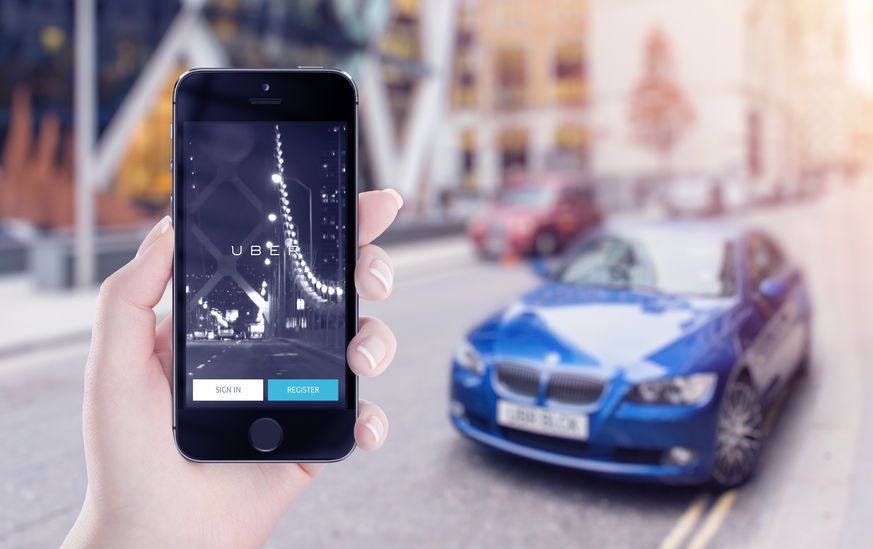California Governor Gavin Newsom has struck a deal with Uber and Lyft that (1) will unionize drivers, and (2) deliver big cost cuts to the ridesharing platforms. But it’s the unions themselves that will benefit most; helpful to the Governor as he prepares for a presidential run.
Uber and Lyft will see a 70% – 94% reduction in how much insurance they have to carry, and while unions will be able to collect dues they won’t get much bargaining leverage.

Uber and Lyft Get To Carry Far Less Insurance
Currently, rideshare platforms in California have to carry $1 million in uninsured/underinsured motorist coverage per driver, per accident. Uber and Lyft complained that this was far higher than what taxis have to carry. They argued this was unnecessary and a magnet for lawsuits.
The California Public Utilities Code requires taxis to maintain liability insurance of $100,000 per person, $300,000 per accident, and $50,000 for property damage. There’s some slight variance at the city and county level to this.
Under the compromise,
- Uninsured motorist coverage drops to $60,000 (so less than taxis!)
- $300,000 per accident cap (if multiple people are injured)

The per-driver insurance requirement drops by 94% and the per-accident maximum drops by 70%. I haven’t found public disclosure of actual policy premiums, but it seems that minimum savings would be in the tens of millions of dollars (but could be nine figures).
Meanwhile, this shifts risk onto drivers and riders. Victims might be left to pursue drivers personally, and the average Uber driver is likely judgement-proof.

Drivers Get A Union With Basically No Bargaining Leverage
This trade gets Uber and Lyft to sign onto collective bargaining rights.. without actually harming their businesses.
- Normally you might need a majority of employees to sign union election cards before holding a union certifying vote. There’s nothing like that here. Just 10% of drivers need to support a specific union, and then that union asks the state to certify them.
- Precisely because rideshare drivers are transient, and aren’t even employees, it would be hard to organize them and get majority support for a union. But the union that gets bargaining rights will be able to charge dues, taxing rideshare drivers, but won’t be able to claim broad legitimacy.
- Since 90% of rideshare drivers may not have supported the union effort, getting solidarity for a work action is going to be similarly tough.
- For the union to be effective in negotiations, it needs to be able to make a credible strike threat. But it seems like a long shot they’ll have this. A large percentage of drivers are likely to cross ‘virtual picket lines’.
- Note also that many rideshare drivers are economically vulnerable, hardly in a position to turn off their apps and forgo income. Without a strike fund, convincing them to do so will be tough – it’ll be individually rational to free ride on bargaining efforts (let other drivers strike while each individual drives).
- A strike doesn’t ‘shut down’ Uber like a factory strike shuts down a physical plant. Even getting a sizeable number of drivers to refuse to log on just means longer wait times, which can be offset by incentives to lure others onto the road.
- Under California Prop 22, drivers are still independent contractors, not employees, and have no legal “right to strike” protection in the classic labor law sense (no NLRA coverage, no anti-replacement rules).
Platforms already face constant churn (many drivers quit within months). This creates a standing pipeline of applicants ready to be activated. If a strike hit, Uber/Lyft could ramp up “earn $500 for your first 50 rides”-style promotions to flood the system with replacements. And anyone with a car that meets standards can sign up in a matter of days.

Drivers don’t gain a lot of leverage here in exchange for the dues they’ll pay. Uber doesn’t face really high costs, and probably saves more in insurance premiums. So risk gets shifted to riders and other drivers on the road, while unions gain more dues.
Governor Newsom gets an important win with an important Democratic constituency, without delivering real benefit to rank and file drivers, and at the cost of his state’s residents (if they ever get into an accident as a passenger, or into an accident with a rideshare driver).
I’m no expert on California law or politics, so I’d love to know what I am missing. It seems like rideshare drivers are taking this on the chin, while being told they’re winning. Remember when tipping was supposed to raise driver pay, but driver pay has gone down since it was implemented?


I’m not gonna pretend to understand California state politics or laws, so, I’ll just say, I like this Gavin fellow… he ‘tells it like it is,’ especially on social media. All caps.
The drivers are getting screwed these days. Uber drivers ask me what Uber wants from me and shows me what Trey are getting, which seems to be around 30%-33%. One driver got under $8 for a $24 ride.
Every progressive’s wet dream: Force 90% to join a union by getting 10% to vote for it.
The biggest problem for Uber drivers going forward are the autonomous vehicles. In San Francisco the Waymos charge more than Uber because people prefer the Waymos to Ubers.
Waymo also has surges which people don’t seem to mind. The difference being with Uber (at least in theory) the purpose of surge pricing is to bring out more drivers. Surge pricing on Waymo is a money grab because there are no drivers to bring out.
Uber surge pricing no longer necessarily increases driver pay.
Gavin is so creative in his ability to screw over his constituents.
Under Newsom people and companies are fleeing Kalifornia. Newsom can claim that he was the first Governor of that state to see the loss of a congressional seat due to population loss. Kalifornia has the highest gasoline prices in the country and the highest energy costs. Great job Newsom. His hometown of San Francisco is filthy dirty, trash everywhere. Truly sad what has happened to that once great city.
Under this arrangement, the unions basically become a pseudogovernment agency with the power to tax low-income Uber drivers without their consent. The money will not be used to help the drivers, but rather will be funneled back to the politicians who made this arrangement possible. A more corrupt scenario is hard to imagine. Welcome to California.
Nuisance (Newsom) has been the most corrupt governor that California has ever had and I say that as a California voter. I am glad he is getting termed out. I hope enough voters are intelligent enough to not put him into the White House.
If people were actually leaving California. Why haven’t we seen a collapse of its housing prices?
anon,
maybe because houses are burning faster than they can be replaced?
$50K for property damage seems very light when the cost of a typical mid range SUV is $80-90K
Love to watch everyone hate on CA from their cesspools. Everyone hating on CA seem to forget that CA is a state invested in taking care of their own. Meanwhile, most of the people criticizing CA could care less about the poor, the sick, the elderly.
Folks like @Coffee Please remind me that CA is a place of kind, principled people, not self-absorbed, greedy turds who don’t give a rat’s @ss about anyone other than themselves. But, hey, ya’ll do you.
Oh, and given that CA is the fifth largest state economy IN THE WORLD and they pay more in taxes to the federal government than they get back, if they left the US, those of you in your poor red states would be screwed.
Drivers get lower insurance costs, you said it earlier in the article. I’m not upset about union dues that don’t exist yet but assuming it’s not exorbitant, any union coverage is better than hoping Uber/Lyft or the government will protect your interests. I’m not particularly excited about this but this article reads like a hit piece and the NDS is predictably unhinged in the comments.
Except there are no insurance premiums. As uber has a captive insurance company. This incompany does some reinsurance (they own the insurance company} through a 3rd party management company but they are essentially self funding there insurance so the loss ratio is all what uber agrees to pay
Ah. Union busting Gary is out again.
Newsom has destroyed California. The clown is a domestic terrorist.
This post was practically engagement bait for right-wingers (with buzzwords like ‘California’ and ‘unions’); hard to take it seriously. So, thank you, @Parker (and @747always), for yet again saying what needs to be said, and calling out the haters.
Not to mention, Gary does ‘union bashing’ on Labor Day… of all days… *sigh*
He could have covered ample stories in aviation and hospitality industries where unions are fighting for their members and for improved conditions for everyone, but no… just cheap tricks.
‘Uber costs more? Unions! Dems!’
*facepalm*
Meanwhile, the astroturfing on here continues to astound me. You’d think most Americans consider themselves as temporarily down-on-their-luck billionaires, even though at best some of us on here have a small business or an inflated real estate portfolio worth maybe a few million dollars. Yet, you’d still ‘carry water’ for the ultra-rich. Psh.
So, I wonder what’ll take to actually rid us of this second Gilded Age, and usher in a new Progressive era? Anyone?
I rarely use Uber or Lyft anymore. Unreliable pickups, difficulty finding a driver between 2300 and 0700, cars that look like they’re on their last legs, and way more sketchy drivers made me decide taxis are a better choice. They may cost more, but they’re vetted, insured, and they show up.
Whether they unionize or not, I don’t care. If there is some mechanism for them to do so, good for them – I hope whatever they pay in dues is made up in some other means received as a benefit.
I would hope insurance protections are at least what they are for taxis.
If Uber drivers strike, will it really do anything? Because they are independent, most drive for multiple platforms. So do they turn off the Uber light in the windshield and turn on the Lyft light?
Union reform is desperately needed. Most union hierarchies are corrupt as can be. I belong to one and the ones that work for the union and the ones at the top get much better insurance benefits than actual members. Keep Uber and Lyft union free. This won’t work well for anyone involved.
When ride sharing ca.e about, most states treated Uber and Lyft like a limousine service which is required to have significantly higher insurance coverage than taxis. Through lobbying in those states, ride sharing is beginning to have the same lower requirements as cabs. California is far from the first state to lower this.
Regarding drivers getting the shaft, never forget that Uber’s long term goal has always been driverless transportation and they’ve never cared about drivers rights.
To those who hate the “haters”, if criticizing the point that 10% voting for a union is binding on the 90% who did not is “hating”, at what level is it OK to criticize? When 5% can bind 95%? When 1% can bind 99%? Or is it hating criticize anything less than everyone everywhere always being required to join a union?
@Thing 1 — That’d be a strawman.
@1990. So am I a hater because I don’t think a 10% “Yes” vote should be enough to force unionization?
What percentage “Yes” vote do YOU think should be needed for unionizing? What percentage should be needed to de-unionize?
This doesn’t shift any liability. If the damages exceed the insurance then Uber or Lyft is still on the hook, it just comes out of their pockets instead of the insurance companies.
Gavin has being bribed and colluding with UBER/Lyft.
@ 1990: Not to mention, Gary does ‘union bashing’ on Labor Day… of all days… *sigh*
And he subscribes to the Austria school of voodoo economics. IOW Fantasyland. Such rugged individualism offering clickbait umbrage to over entitled, unrealistic airline passengers. Where do we find such men?
I’m actually stunned the state is agreeing to allow them to carry lower insurance limits. The drivers should not carry less than a million dollars. Do they understand, just because they have insurance, doesn’t mean they’re insured. You carry $100,000 in liability insurance then cause a $500,000 accident. Your insurance pays $100,000. You’re on the hook for other $400,000. Were you insured? Or did you just have insurance?
Gavin Newsome is the worst. Name one thing he hasn’t Fd up in CA.
People don’t understand what being judgement proof is. Most Uber drivers do not own expensive real estate that can possibly be lost to a judgement. They have very little that can be taken. Therefore the $100,000 of liability insurance is most of or all another party can collect. Of course the lawyers take a chunk of that. Also, the numbers in the post are higher so arguing about $100,000 is somewhat of a strawman argument. If it is assumed that the coverage will be the same as taxis, the liability numbers will be $100,000 for one person in the other vehicle, $300,000 for all people in the other vehicle and $50,000 for property damage to the other vehicle or whatever was involved. So the total liability is $350,000. The $60,000 uninsured/underinsured motorist insurance is probably for liability insurance for the Uber driver’s passengers. California implemented Obamacare (ACA) so everyone is supposed to have health insurance coverage as a backup.
This is criminal how much Uber/Lyft are exploiting the drivers. On $750.00 weekly income, they are taking away $400.00 from drivers. When you are trying to use the car insurance, the first seven days the drivers don’t get paid anything. The drivers are paying a high price for the insurance and the insurance is scamming the drivers. Drivers are supposed to independent contractors: when a driver doesn’t accept calls/ rides because the amount is too low such as: $2,65;$3.11;$3,85 etc., Lyft degraded me from Platinum to Blue Tier, the lowest level. My income dropped drastically! I had to drive for Uber 46 miles to pickup a passenger and to be paid $9,85.! How is that making any sense? A passenger paid Uber $46,00 and I got paid $11.00, driving 40 miles. Uber and Lyft used to give out bonuses such as having 70 rides from Monday to Friday at midnight, drivers used to be paid $280.00 bonus. From Friday night at midnight to Sunday at midnight, if a driver made additional 15-20 rides, he would be paid another $18.00. Nowadays, no more. The economy is plummeting, prices are skyrocketing and Uber/Lyft driver are being paid less, no bonuses and struggling to survive! Many drivers cannot afford to support their families and breakup. Many drivers are homeless! What a heck is doing our government?
Said nothing about undocumented people taking a great number of these gig jobs from citizens. Gavin and the Dems don’t care.